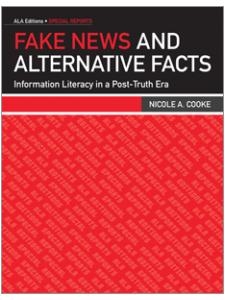Primary tabs
You don't need to be an ALA Member to purchase from the ALA Store, but you'll be asked to create an online account/profile during checkout to proceed. This Web Account is for both Members and non-Members. Note that your ALA Member discount will be applied at the final step of the checkout process.
If you are Tax-Exempt, please verify that your account is currently set up as exempt before placing your order, as our new fulfillment center will need current documentation. Learn how to verify here.
- Description
- Table of Contents
- About the author
- Reviews
Listen to a podcast with the author now!
Talk of so-called fake news, what it is and what it isn’t, is front and center across the media landscape, with new calls for the public to acquire appropriate research and evaluation skills and become more information savvy. But none of this is new for librarians and information professionals, particularly for those who teach information literacy. Cooke, a Library Journal Mover & Shaker, believes that the current situation represents a golden opportunity for librarians to impart these important skills to patrons, regardless of their age or experience. In this Special Report, she demonstrates how. Readers will
- learn more about the rise of fake news, particularly those information behaviors that have perpetuated its spread;
- discover techniques to identify fake news, especially online; and
- explore methods to help library patrons of all ages think critically about information, teaching them ways to separate fact from fiction.
Information literacy is a key skill for all news consumers, and this Special Report shows how librarians can make a difference by helping patrons identify misinformation.
Preface
1 Introduction 1
- Fake News Is Old News
- The Need to Be Multi-Literate
- Understanding the Current State of the Media
2 The Information Behavior of It All
- Learning Theory
- Misinformation/Disinformation
- An Emotional Dimension of Information Behavior
3 The Illusion of Internet Savvy
- Political Economy and the Illusion of Choice
- The Rise of Iterative Journalism
4 Critical Thinking and Metaliteracy
- Critical Thinking
- Critical Media Consumption through Multiple Literacy Instruction
5 Conclusion
- Revisiting the Headlines
- Moving Past Fake News
- Lesson Plan
- Examples from the Illinois Workshop
Appendix: Additional Resources
- The Larger Context of Fake News—Suggested Books
- Multiple Forms of Literacy—Suggested Articles and Websites
- Resources for Information Consumers
References
About the Author
Index
Nicole A. Cooke
Nicole A. Cooke is the Augusta Baker Endowed Chair and an Associate Professor at the School of Library and Information Science at the University of South Carolina. Her research and teaching interests include human information behavior (particularly in an online context), critical cultural information studies, and diversity and social justice in librarianship (with an emphasis on infusing them into LIS education and pedagogy). She was named a “Mover & Shaker” by Library Journal in 2007 and was the 2016 recipient of ALA's Equality Award and the 2017 Achievement in Library Diversity Research Award presented by ALA's Office for Diversity, Literacy & Outreach. She has edited and authored several books, including Information Services to Diverse Populations. Dr. Nicole A. Cooke was honored with the 2024 Joseph W. Lippincott Award for distinguished service in the profession of librarianship.
"Cooke helpfully emphasizes the uncertainty of what anyone knows about how disinformation works and discusses not only deceptive acts but also how the business practices of legitimate sources have led to our current, muddled environment. Both public and academic librarians can benefit from this work."
— Booklist
"This report not only frames the issue of fake news, but also provides useful approaches for teaching users how to identify and address fake news. In addition, it includes a lengthy appendix of suggested books, articles, and websites any reader interested in this topic will find useful ... Timely, engaging, and highly recommended."
— Technical Services Quarterly
"Provides a concise examination of the most recent iteration of the fake news phenomenon with a discussion of how the use of knowledge of information behavior and critical evaluation skills can combat the consequences of fake news. Cooke argues that the sheer amount of news and other information that is broadcast over the Internet requires strong literacy skills, notably the ability to critique the news ... She also provides a quick list of tips for evaluating information geared towards information professionals as well as a sample lesson plan based on an actual workshop on the subject."
— SJSU Student Research Journal



